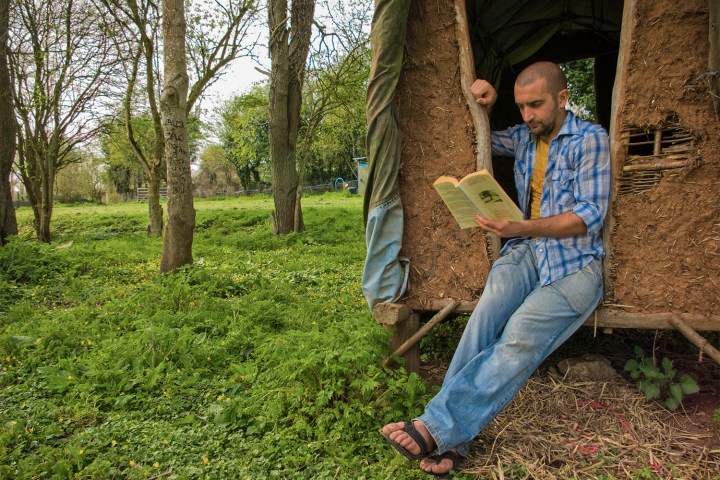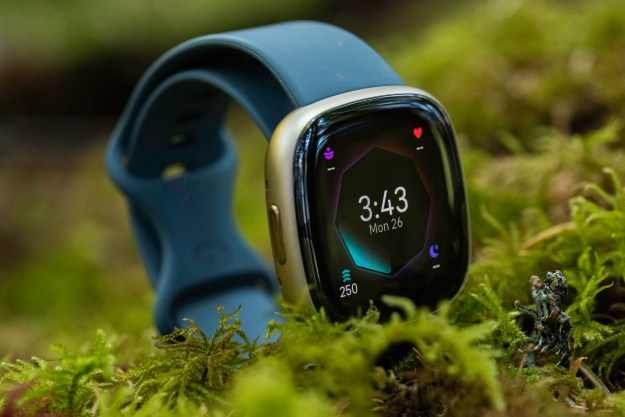
Not Guardian journalist Mark Boyle. If he were by my side at the river, he’d no doubt shake his head at my devotion to such frivolous, modern distractions and conveniences. He wouldn’t follow me to my car either. You see, the mountain is his home, because he’s just started a crazy new lifestyle where he rejects technology to live like primitive man did. And oh boy, is he going all-out.
If the daily, constant flood of emails, Twitter notifications, SMS, and calls makes you want to throw your iPhone off the nearest tall building, it can be very tempting to embrace your inner Fred or Wilma Flintstone and disappear to live off the land, just like him. We’re here to urge you to think twice. It’s fine (although a bit weird) for one guy to do it, but if we all get the same idea, things could go very wrong, very quickly.
It’s simply not feasible, logical, or even responsible for us all to consider making a go of some hippy, tech-free lifestyle today.
Hardcore survivalist
It’s not the first time this type of experiment has been carried out. Many people have disconnected from the internet or lived without their phones for a week or two. There are even more of those crashing bores who chastise others for a perceived over-reliance on tech, after someone dared to use a phone in their presence. Boyle is different. His new life is no half-measure. He’s living in a cabin built from mud and rocks, with no electricity, no fixed water supply, no shower, no Netflix, no smartphone, no vehicle, no refrigerator, and one assumes, no sanitation.
I’m all for the responsible use of technology, but to shun it and the modern world, borders on madness.
He knows it’s not everyone’s idea of a good time, though, and isn’t saying everyone should rise up, overthrow oppressive virtual assistants, and run out into the fields laughing and smiling like extras from Little House on the Prairie. However, he paints a surprisingly attractive picture of a world without tech. You can almost hear the birds singing in the trees, and smell the fresh countryside in his words.
The spell breaks when you realize that life without technology, in Boyle’s view, means becoming a hermit. His brave old world seems to mean living like Obi-wan Kenobi in Star Wars: A New Hope. Just with the robots and lightsabers replaced by squirrels and branches. It’s this removal from society that is the most uncomfortable part of Boyle’s new lifestyle. It’s actually inevitable. Erasing oneself from both city and connected life today is the same as erasing oneself from the world. Even speaking as an introvert, this sounds pretty unpleasant.
It’s for the best he doesn’t make the whole thing too damn enticing, because as we’ll find out, that would be a very bad thing indeed.
What’s that hole for? Oh …
Let’s go back to me washing my clothes in that stream. I’m finished, and have loved it so much I’ve quickly constructed a hut, which I’ll call home from now on. What next? Food, probably. I’m not Ray Mears, so I have no idea what berries will be a nourishing meal and what berries will see me convulse on the ground in agony. Without the internet, I can’t check, either. Not to worry, my mate Boyle has left me some roots, so I’ll crunch those up. Soon after, I chuck him out so he can begin the long trudge back to his own cabin. It can’t be too close by because that would be convenient, and go against the hermit code.
Next on my list would be to dig a hole for you-know-what before bed, and because I don’t have a job, I have no money for things like toothpaste (I guess I’ll use some grass or something). Then I’ll sleep in close proximity to all the bugs humanity has worked hard to keep out of their houses for centuries. Sounds like camping, only permanently, and much, much worse.
It all sounds like turning back the clock to before the Industrial Revolution. What was that like, you might wonder? Apparently, it wasn’t much fun. “Life for the average person was difficult, as incomes were meager, and malnourishment and disease were common,” says history.com. Sounds lovely.
Boyle’s new off-the-grid lifestyle may sound fascinating, but for rational people, his reality must surely be unpalatable.
The collapse of civilization
No matter how much you despise technology, whether it’s a phone, a car, or a power station, living entirely without modern technology would be incredibly drastic. We imagine you’d have to be really unsatisfied with life, escaping from who-knows-what, or be driven by some grand passion to push boundaries like Boyle to consider it.
Worse, tech haters are dead wrong about life being better if tech didn’t exist.
Tech haters are dead wrong about life being better if tech didn’t exist.
Philosopher Clay Shirky told The Atlantic imagining the world without the internet alone is to imagine it without civilization. “The only credible post-internet visions are all tied to civilizational collapse,” he said. That means things like pandemics, nuclear war, and other apocalyptic scenarios.
Technologist Kevin Ashton, writing in response to those who think technology is bad, says without it and even the most basic tools, most of us would be dead in a few days. “Our bodies,” he argues, “are not configured to survive without the aid of technology.” The humans before us had stronger jaws, big teeth, a lot more hair on our bodies, and considerably more robust digestive systems. You, me, and Boyle aren’t made that way anymore and have evolved in-line with the technology we’ve invented.
Even the residents of Green Bank, West Virginia — the National Radio Quiet Zone, where no connected or electrical devices are allowed — don’t exist in some time warp. They have modern homes, toilets, jobs, stores, vehicles, and, well, civilization. If you’re looking for a way to escape city life, and the pressures it sometimes brings, then arguably Green Bank and its surrounding towns is the right place to go.
Dead by dawn
Why would it be bad if we all headed out into the wilderness? One last time, let’s imagine I’m happy in my hut, have worked out what food makes me vomit, got myself a prime bit of grass and a little stream, and am slowly but surely converting others to mine and Boyle’s way of life. The cities are emptying, and the countryside is filling up, as we revert back to the way we were before. What a wonderful new world.
Well, perhaps not. Ashton says even if we do master the basic art of survival without technology, and everyone else wants the same thing, the world won’t be a better place. “Imagine doing all these things in competition with other people and species, all trying to find natural shelter, naturally potable water, digestible food, and to keep their families alive.’ He asks, “How long could you survive?”
I’ve seen enough episodes of The Walking Dead to know it probably wouldn’t be very long. The idyllic days of washing my clothes in that mountain stream would get a lot less idyllic if I’m constantly watching out for someone sneaking up behind me, ready to bash in my brains in for the seeds in my pocket.
I’m all for the responsible use of technology, but to shun it and the modern world, borders on madness. Boyle’s experiment is fascinating, but one I’ll watch from afar. It seems the rest of humanity would be wise to do the same.




